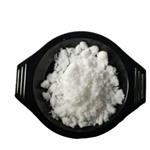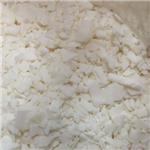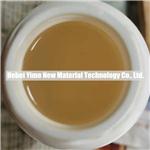Hydrogenated castor oil: pharmacokinetics, applications and toxicity
Sep 19,2023
General Description
Hydrogenated castor oil is widely used in various industries. It serves as an industrial lubricant and a medicinal purgative, specifically recognized as a safe and effective stimulant laxative. Additionally, it finds applications in paints, coatings, plastics, and water-repellent coatings. It is used in products such as candles, shoe polish, carbon paper, ointments, and for impregnating paper, wood, and cloth. Hydrogenated castor oil is also utilized as an electrical condenser impregnation, solid lubricant, and pressure mold release agent in the manufacturing of plastics and rubber goods, and in the waterproofing of fabrics. Studies have shown its metabolism and elimination in rat tissues. While generally safe, it may contain low concentrations of castor bean allergens, causing immediate hypersensitivity reactions in sensitized individuals. However, further research is needed to determine its toxicity in terms of cell-mediated hypersensitivity.

Figure 1. Hydrogenated castor oil
Pharmacokinetics
Hydrogenated castor oil exhibits distinct pharmacokinetic characteristics, as observed in a study by Binder et al. (1970). The deposition of hydroxystearic acid (HSA) and its metabolites, including hydroxypalmitic acid, hydroxymyristic acid, and hydroxylauric acid, was detected in abdominal fat and other body lipids. The composition of HCO-derived hydroxy fatty acids in rat lipids differed over time. In the 1% HCO diet group, HCO-derived fatty acids accounted for approximately 0.90% of abdominal fat acids after 4 weeks, decreasing to around 0.35% over an 8 to 16-week period. The highest content of HCO-derived hydroxy acids (around 4.4% in abdominal fat) was observed after 4 weeks on the 10% HCO diet, decreasing to <2% at 16 weeks. A rapid decrease in HCO-derived hydroxy fatty acids occurred when transitioning from the HCO diet to the control diet. After 4 weeks on a 1% HCO diet, the proportion of HCO-derived fatty acids in abdominal fat was approximately 0.90%, which then decreased to around 0.35% over an 8 to 16-week period. Overall, the study provides insights into the metabolism and elimination of HCO in rat tissues. 1
Applications
Hydrogenated castor oil has various applications across different industries. It is commonly used as an industrial lubricant and a medicinal purgative. Medicinal castor oil, which does not contain ricin, is recognized as safe and effective for use as a stimulant laxative. In addition to its use in lubricants and medicine, hydrogenated castor oil finds application in paints, coatings, plastics, and water-repellent coatings. It is used in products such as candles, shoe polish, carbon paper, ointments, and impregnating paper, wood, and cloth. It serves as an electrical condenser impregnation, solid lubricant, and pressure mold release agent in the manufacturing of plastics and rubber goods. It has also been used in waterproofing fabrics. The FDA recognizes castor oil as generally safe and effective for use as a stimulant laxative but not as a wart remover. Castor oil is included in the list of inactive ingredients present in approved oral, intramuscular, and topical drug products. Some salts and esters derived from ricinoleic acid, a component of castor oil, have FDA-approved direct/indirect food additive uses. Overall, hydrogenated castor oil has diverse applications in various industries, including lubrication, medicine, coatings, and additives, with recognized safety and effectiveness in specific uses. 2
Toxicity
A study aimed to evaluate the toxicity of Hydrogenated castor oil through patch and prick tests on human subjects with occupational hypersensitivity to castor allergens. The results indicated that immediate hypersensitivity reactions were observed in the three sensitized patients when exposed to castor bean extract, while no reactions were observed in normal subjects. However, the level of sensitivity to the SLS Castor Wax extract was significantly lower than that induced by castor bean extract. Further tests were conducted to determine if Castor Wax in different solvents or a deodorant stick containing Castor Wax would induce irritation and elicit a positive hypersensitivity reaction in the sensitized patients. No positive skin reactions were detected in response to the Castor Wax in different solvents or the deodorant stick. Patch tests for cell-mediated hypersensitivity revealed no delayed reactions in any of the patients when exposed to the four Castor Wax extracts. However, the presence of low concentrations of allergens in Castor Wax was confirmed based on positive immediate skin reactivity and positive direct radioallergosorbent test for castor allergens induced by the SLS Castor Wax extract. In conclusion, the study suggests that Hydrogenated castor oil contains castor bean allergens at low concentrations, and immediate hypersensitivity reactions may occur in individuals sensitized to castor allergens. However, the toxicity of Castor Wax in terms of cell-mediated hypersensitivity remains inconclusive based on the patch test results. 3
Reference
1. Binder, R. G., A. N. Booth, D. J. Robbins, and G. Fuller. Hydroxystearic acid deposition and metabolism in rats fed hydrogenated castor oil. Lipids, 1970, 5:832–837.
2. Final report on the safety assessment of Ricinus Communis (Castor) Seed Oil, Hydrogenated Castor Oil, Glyceryl Ricinoleate, Glyceryl Ricinoleate SE, Ricinoleic Acid, Potassium Ricinoleate, Sodium Ricinoleate, Zinc Ricinoleate, Cetyl Ricinoleate, Ethyl Ricinoleate, Glycol Ricinoleate, Isopropyl Ricinoleate, Methyl Ricinoleate, and Octyldodecyl Ricinoleate. Int J Toxicol, 2007, 26 Suppl 3:31-77.
3. Lehrer, S. B, R. M. Karr, D. J. G. Muller, and J.E. Salvaggio. Detection of castor allergens in castor wax. Clin. Allergy, 1980, 10:33–41.
- Related articles
- Related Qustion
- The Applications and preservation methods of hydrogenated castor oil Mar 7, 2024
Hydrogenated castor oil, also known as castor wax, is a widely used ingredient used in various industries such as cosmetics, pharmaceuticals, and food.
- Uses of Hydrogenated Castor Oil Jan 6, 2022
Castor oil, once widely used as a domestic purgative, is now more restricted to hospital use for administration after food poisoning and as a preliminary to intestinal examination.
Functionalized Fullerene C60 improves electron transfer rates in biosensors, enhancing sensitivity and detection capabilities in glucose and urea biosensors.....
Sep 19,2023APIAntioxidant 1520, chemically known as 2,4-bis(n-octylthiomethylene)-6-methylphenol) is one of the alkylthiomethylphenol antioxidants with excellent performance.....
Sep 19,2023APIHydrogenated castor oil
8001-78-3You may like
Hydrogenated castor oil manufacturers
- Hydrogenated Castor Oil
-

- $18.00 / 10kg
- 2024-05-10
- CAS:8001-78-3
- Min. Order: 1kg
- Purity: 99.9
- Supply Ability: 5000
- hydrogenated castor oil flakes
-

- $3500.00 / 1T
- 2024-04-28
- CAS:8001-78-3
- Min. Order: 1T
- Purity: 99%
- Supply Ability: 1000kg/day
- Hydrogenated castor oil
-

- $20.00 / 1kg
- 2024-04-28
- CAS:8001-78-3
- Min. Order: 1000kg
- Purity: 99%
- Supply Ability: 5000kg/week




